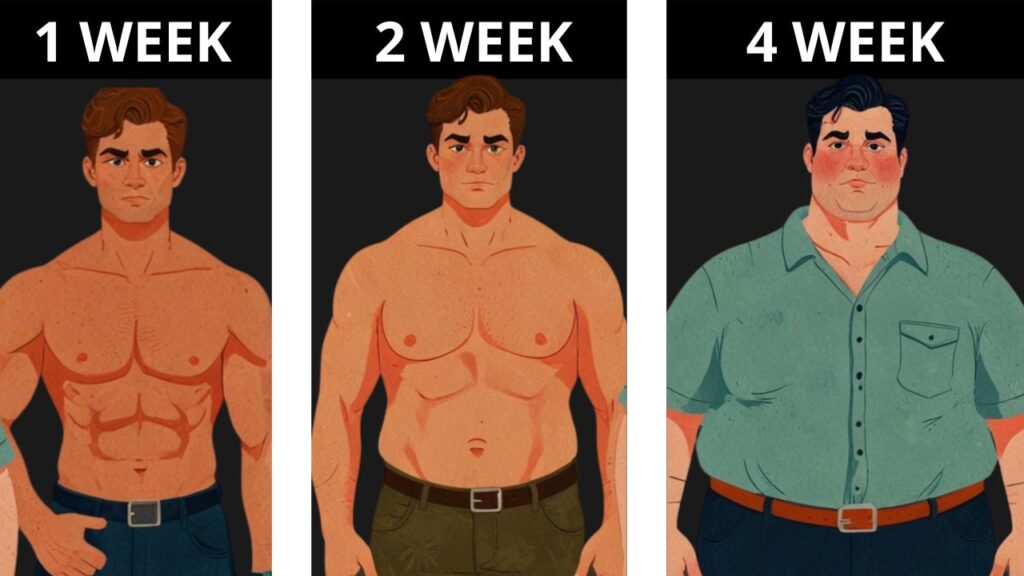5 Common Mistakes When Following a Caloric Deficit

A caloric deficit is one of the most popular and scientifically proven methods to lose weight. The formula seems simple: consume fewer calories than your body burns, and you'll lose fat.
However, if you've been following a caloric deficit for weeks without seeing results—or even worse, gaining weight—you're probably making some common mistakes without realizing it.
In this guide, we’ll cover:
- What a caloric deficit is and how it works
- The 5 most common mistakes that sabotage weight loss
- How to fix each mistake
- Answers to the most frequently asked questions
What Is a Caloric Deficit?
A caloric deficit happens when you consume fewer calories than your body needs to maintain its weight.
Simply put:
- If you eat fewer calories than you burn → You lose weight
- If you eat more calories than you burn → You gain weight
- If you eat the same amount of calories you burn → You maintain your weight
How Many Calories Should You Eat to Lose Weight?
The average caloric deficit ranges between 300–500 calories per day, which typically results in 0.5 to 1 pound of fat loss per week.
| Goal | Caloric Deficit | Weekly Weight Loss |
|---|---|---|
| Slow Fat Loss | 250-300 kcal | 0.5 lbs |
| Moderate Fat Loss | 400-500 kcal | 1 lb |
| Aggressive Fat Loss | 600-800 kcal | 1.5-2 lbs |
💡 Pro Tip: The more sustainable the deficit, the easier it will be to maintain your results long-term.
5 Common Mistakes When Following a Caloric Deficit
Even if you're doing everything right, small missteps can prevent weight loss or even cause weight gain.
Let's break down the five most common mistakes and how to fix them.
1. Underestimating Calories Consumed
One of the most common mistakes is eating more calories than you think while believing you're in a caloric deficit.
Why Does This Happen?
- Misjudging portion sizes
- Forgetting to log snacks, sauces, or cooking oils
- Not tracking liquid calories (like juices or coffee creamers)
How to Fix It:
- Use a kitchen scale to measure portions
- Track everything you eat with apps like MyFitnessPal
- Be honest about serving sizes
💡 Pro Tip: Even healthy foods like avocados, nuts, and olive oil are calorie-dense—don't skip tracking them!
2. Eating Too Little (Severe Caloric Deficit)
Many people think that the fewer calories they eat, the faster they'll lose weight—but that’s not always the case.
What Happens When You Eat Too Little?
- Your metabolism slows down
- You lose muscle instead of fat
- You feel tired, irritable, and constantly hungry
How to Fix It:
- Eat in a moderate deficit (300–500 calories below maintenance)
- Prioritize protein intake to preserve muscle mass
- Incorporate refeed days or diet breaks every 4-6 weeks
3. Ignoring Protein Intake
Protein is your best friend during a caloric deficit. It helps:
- Preserve muscle mass
- Keep you fuller for longer
- Burn more calories through digestion (thermic effect of food)
How Much Protein Do You Need?
| Goal | Protein Intake |
|---|---|
| Fat Loss | 0.7–1.0g per pound of body weight |
| Muscle Maintenance | 1.0–1.2g per pound |
Best Protein Sources for a Caloric Deficit:
- Chicken breast
- Greek yogurt
- Tofu
- Lentils
- Protein shakes
4. Overestimating Calories Burned from Exercise
It's easy to fall into the trap of thinking:
"I worked out today, so I can eat more."
Why This Happens:
- Fitness trackers often overestimate calorie burn
- Strength training burns fewer calories than cardio
- Many people reward workouts with extra snacks
How to Fix It:
- Don’t eat back calories burned during workouts
- Focus on weekly calorie balance rather than daily numbers
- Use exercise for health and strength, not just weight loss
5. Stress and Lack of Sleep
Stress and sleep deprivation can completely stall your weight loss progress.
How Stress Affects Weight Loss:
- Increases cortisol (stress hormone)
- Leads to water retention
- Triggers emotional eating and cravings
How to Fix It:
- Prioritize 7–9 hours of sleep every night
- Practice mindfulness techniques like meditation or journaling
- Avoid excessive caffeine and screen time before bed
How Long Should You Stay in a Caloric Deficit?
Most experts recommend staying in a caloric deficit for 8-12 weeks, followed by a short maintenance break.
| Duration | Deficit Size | Goal |
|---|---|---|
| 4-8 Weeks | 300-500 kcal | Slow, sustainable fat loss |
| 8-12 Weeks | 500-800 kcal | Moderate fat loss |
| 12+ Weeks | 800+ kcal | Aggressive fat loss (not recommended long-term) |
Weight gain on a caloric deficit can be due to water retention, miscalculated food intake, hidden calories, or reduced activity levels. Make sure you're tracking your food accurately and managing stress properly.
First, double-check that you are truly in a caloric deficit. Use a food scale, track everything accurately, and reassess your activity level. Also, monitor sleep and stress levels as they can impact weight loss.
Most people should stay on a caloric deficit for 8-12 weeks before taking a short break at maintenance calories. This helps prevent metabolic slowdown and makes weight loss more sustainable.
Yes! High stress increases cortisol levels, which can cause water retention, increased cravings, and disrupted sleep. Reducing stress through relaxation, proper sleep, and exercise can improve fat loss results.
Yes, daily weight changes are normal due to water retention, digestion, and hormone fluctuations. Focus on weekly trends instead of daily weight changes for a clearer picture of progress.
How to Succeed in a Caloric Deficit
✔ Track your food intake accurately
✔ Eat enough protein
✔ Exercise consistently, but don't rely on calorie burn
✔ Prioritize sleep and stress management

Posts That May Interest You